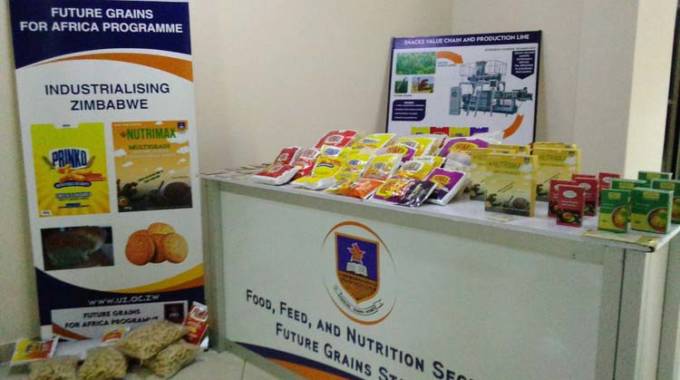Source: Student produces snacks from future grains | The Sunday Mail
Leroy Dzenga
Senior ReporterWHEN Arlene Andirigu was in her fourth year, reading for a Bachelor of Science in Food Sciences and Technology at the University of Zimbabwe, one module stood out.
The food product development class she took demanded that she put into practice what she had learnt throughout the years.
“We were required to produce new products that are not on the market and develop them.
“I decided to produce a snack which is based on what are called traditional grains, but here we call them future grains,” she told The Sunday Mail.
And this was in 2019, the year UZ had finished setting up an Innovation Hub.
Future grains, sometimes derisively referred to as small grains, include sorghum, pearl and finger millet.
For Andirigu, this meant that unlike her predecessors whose academic discoveries lived and died on paper, she had the opportunity to incubate her idea and possibly commercialise it.
Following discussions with her lecturers, who had seen potential in her work, she was among the first innovators to enrol at the UZ Innovation Hub.
“When I was doing further research, I realised that future grains are presented in a way that at times does not promote (their) consumption.
“Future grains have been underutilised; in most cases, they are used for preparing either porridge or sadza.
“I wanted to present them in a way that would make eating them exciting,” she said.
This culminated in the production of snacks such as puffs from future grains.
“We have been working on the research to make it commercially viable.
“With this research, we decided to use locally available raw materials to produce goods, and we settled for the underutilised future grains to produce unique ready-to-eat products.”
This idea was motivated by the need to reduce malnutrition and improve eating habits.
Climate change pushed her to use future grains as feedstock.
“Future grains are drought-resistant and this allows them to grow even during difficult years of inadequate rains.
“We were not going to be worried about water and diseases in their production,” she said.
Her product is now ready for mass production and she hopes the market demand will be high so that the benefits can trickle down to hard-working farmers who are growing future grains.
She said developing the snack from an idea into a edible product involves going through a process called kitchenbook development.
It is a process that involves using a small sample of potential consumers to give an opinion on the product.
“What happens is you take your idea into the kitchen; you prepare the snack as you imagine it.
“After that, you make adjustments until you have a formulation which is most likely to be widely acceptable and is replicable.”
UZ assisted Andirigu to patent the idea, meaning it is now protected by law against unauthorised reproduction.
The idea has now found a home in the Future Grains for Africa Programme currently being funded by the Ministry of Higher and Tertiary Education, Innovation, Science and Technology Development.
The snacks are now in the commercialisation phase, meaning they will be available in retail and wholesale outlets soon.
“We are finalising a few things, but the product is ready for the market,” she said.
A start-up, under which the product will be marketed and sold, is being set up.
The 25-year-old Masters in Food Science Masters student (MPhil) said she derives satisfaction from knowing that an idea that came to life in the lecture room has potential to sustain her and employ
others.“There is no greater feeling than putting what you learnt into practice. I hope my work gets to inspire those who were giving up on education thinking that it does not pay.
“I am grateful to my parents for giving me an opportunity to learn, and the process has been totally fulfilling.”
Collaboration was a major ingredient in Andirigu’s success story.
“We worked as a team. I had lecturers who were assisting me throughout the process. These include Dr Prosper Chopera, Dr Loveness Nyanga and all the other lecturers from the food science department.
“I was also working with colleagues; it was a whole system.
“There are capacities which we did not have in the department and I had to engage those who had them to ensure we came up with a good product.”
Although snacks are going to introduce her ingenuity to the Zimbabwean market, she hopes to deliver more in the future, resources permitting.
“There are plans to come up with spaghetti, soup and pasta from future grains, provided we have resources.”
Andirigu is a beneficiary of the Education 5.0 which is meant to repurpose higher institutions of learning into incubators of products and processes for industry.
Her patent is among the 100 which the University of Zimbabwe has registered.
It is believed the country could be witnessing an embryonic revolution where its young people have taken charge of the future of industry and commerce through innovation.
Newer Post
Suspended town clerk gets windfall Older Post
NSSA chairman lays out plans 
COMMENTS